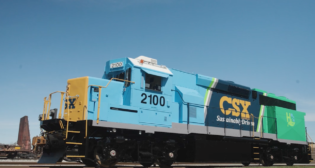
USDA to STB: Move ‘Quickly to Strengthen Our Rail System’
Written by Marybeth Luczak, Executive Editor
“The delays and unpredictability seen in rail service are partly the result of the railroads’ embrace of precision-scheduled railroading (PSR) and its drastic reductions in workforce and assets to reduce operating ratios at the expense of service,” U.S. Secretary of Agriculture Thomas J. Vilsack told the Surface Transportation Board members.
“Unfortunately, while rail service has improved from its worst levels last year, it remains inadequate and unreliable for many agricultural shippers,” U.S. Secretary of Agriculture Thomas J. Vilsack told the five Surface Transportation Board (STB) members in identical letters dated May 12. “There is more work to be done.” This includes, he wrote, moving forward on open proceedings and reciprocal switching; providing clarity on the railroads’ common carrier obligation; and collecting more first-mile/last-mile (FMLM) service data.
In the letters, Vilsack expressed his “sincere appreciation” for the STB’s work over the past year—accomplished under “existing limited resources”—and his “continued encouragement for immediate and continued action.” (Download the letter to STB Chair Martin Oberman below.)
“When I wrote the Board about rail service issues in March 2022, rail service was, in many ways, as poor as it had ever been,” Vilsack reported. “I was pleased to see the Board act swiftly by hosting our Deputy Secretary at a hearing on rail service deterioration, opening a proceeding to revise its procedures for expedited relief for service emergencies, and considering rules around railroads’ use of private cars. I was also encouraged by the Board’s collection of more service data, your December hearing on Union Pacific Railroad’s (UP) increased use of embargoes, and especially the Board’s final rules to streamline rate review in small cases.”
However, Vilsack pointed out that more work is needed. “The delays and unpredictability seen in rail service are partly the result of the railroads’ embrace of precision-scheduled railroading (PSR) and its drastic reductions in workforce and assets to reduce operating ratios at the expense of service,” he wrote. “As USDA has long expressed, the PSR operating model does not leave sufficient buffer in labor and assets for railroads to be able to handle unexpected spikes in demand, such as those seen over the past few years. And, as we’ve seen recently, this way of operating leaves the door open to unsafe working conditions which are harmful to workers themselves, and further increase the likelihood of catastrophic events like derailments when the skeleton staff has as little as a few minutes to inspect each railcar.”
He told the STB members that “[i]t is of utmost important that the STB moves quickly to strengthen our rail system overall and specifically to improve service to agricultural shippers before railroad capacity again becomes an urgent, national issue.” He noted that “[t]his work must also ensure the safety of rail workers and communities.”
Specifically, Vilsack urged the STB to “urgently and expeditiously:
- “Move forward on the open proceedings on private railcar use and emergency service orders. The shipper petition on private railcar use would improve incentives and restore balance around the railroads’ use of private cars and demurrage. The Board’s proposed changes to the emergency service rules will help provide relief in times of severe disruptions, which have become more frequent.
- “Move forward on reciprocal switching. Following the Board’s approval of the merger between Canadian Pacific Railway and Kansas City Southern Railway, ensuring adequate industry competition is more important than ever. The Board’s ongoing oversight of the highly consolidated rail industry is key to this objective.
- “Provide clarity on the railroads’ common carrier obligation. The railroads must provide reasonable service upon reasonable request. However, without clarity on what these terms mean and how the policy will be enforced, railroads are able to make unilateral decisions, with little regard for shipper needs. For example, a few observations raise important questions about whether railroads are meeting their obligation: first, UP’s use of embargoes to manage congestion and, also, the multiple cases brought to the Board where a shipper’s service was cut from 5 to 3 days per week.
- “Collect additional first-mile/last-mile (FMLM) service data. USDA appreciates the additional data the Board has been collecting as part of its monitoring. However, USDA encourages STB to significantly expand that data collection to cover additional commodities and provide more granular geographic data. Agricultural shippers have continually reported, to USDA, distinct service issues affecting specific regions of the country. More granular commodity and geospatial FMLM data will significantly improve visibility into those issues.”
Vilsack summed up that the railroads “should not be able to continue to operate without buffer for unexpected demand, make historic profits, and engage in enormous stock buybacks, all while providing subpar service to agricultural shippers and disregarding safety.” He told the STB that it “can and should counteract these negative trends in rail transportation by increasing competition and improving oversight with enhanced data. The Board should also ensure the railroads balance their focus on shareholders with their duty to provide high-quality common carrier rail service to the nation.”



